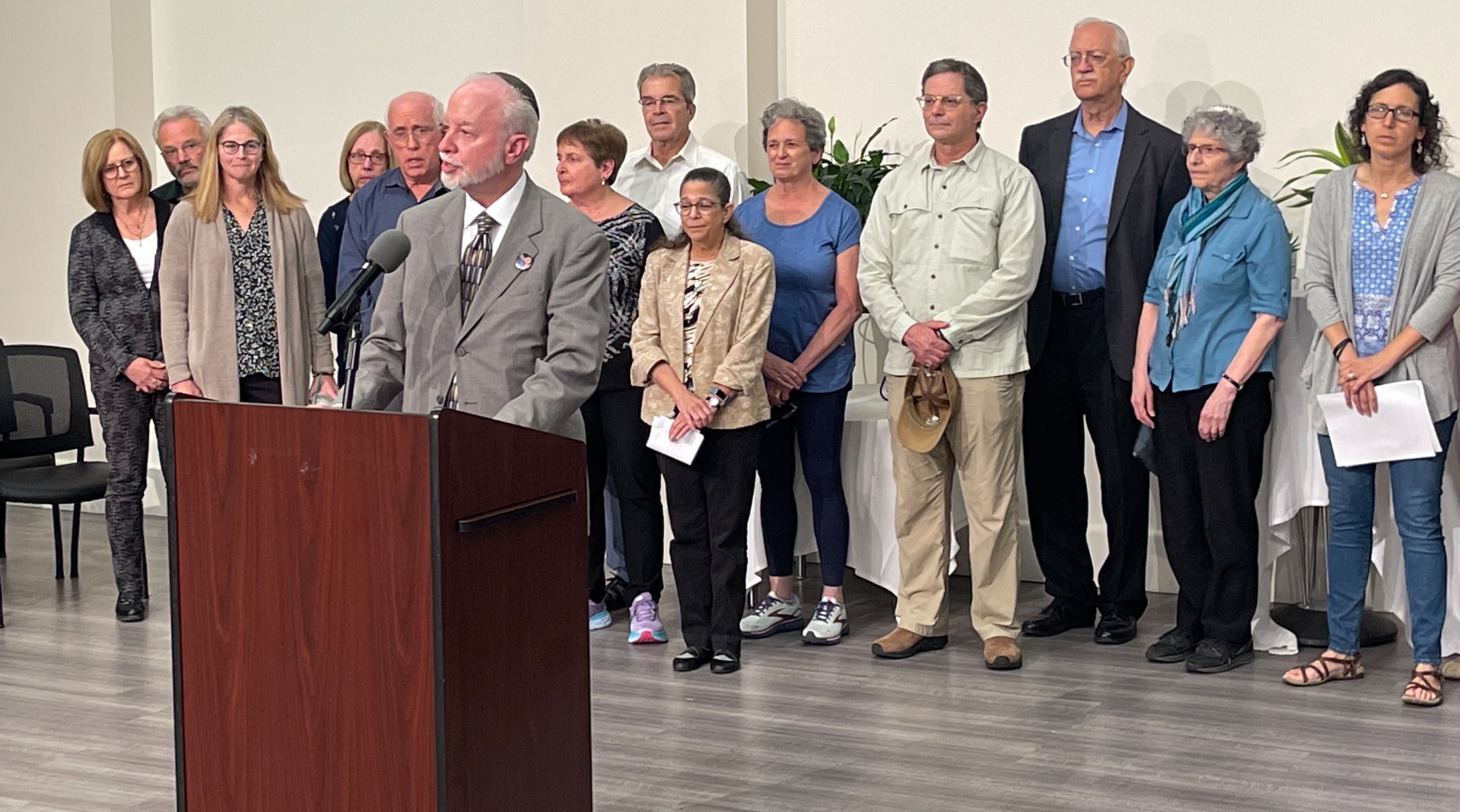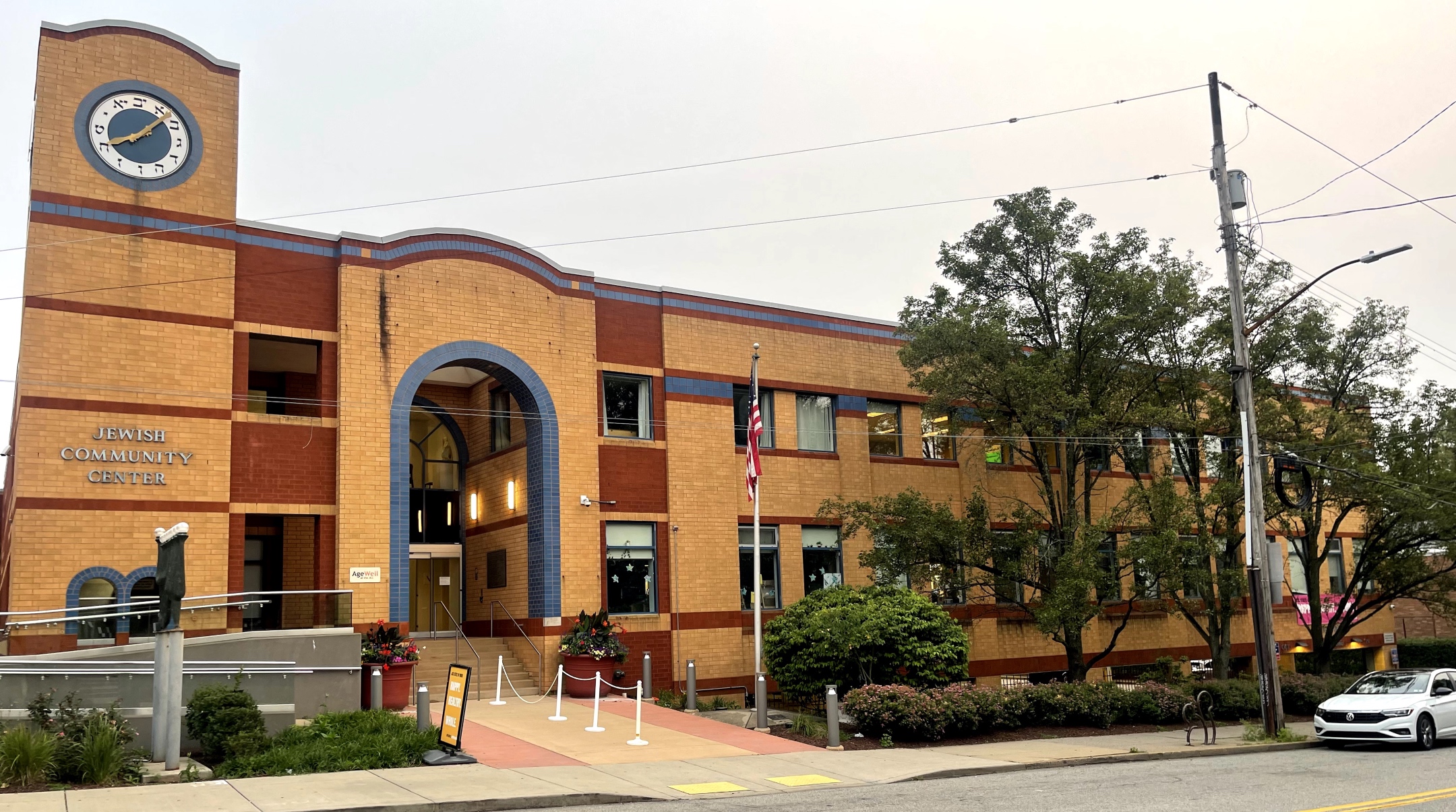After synagogue gunman’s death sentence, Pittsburgh’s Jews feel relief, resilience — and gratitude
Family members and survivors of the attack recite the Shehecheyanu prayer, the prayer for thanks, in Hebrew at a press conference

Rabbi Jeffrey Myers leads survivors and families of the attack on the Tree of Life synagogue in a prayer of thanks, at the Jewish Community Center in Pittsburgh, Aug. 2, 2023. (Ron Kampeas)
PITTSBURGH (JTA) — The overriding feeling in this city now that the gunman convicted of murdering 11 Jews here in 2018 has been sentenced to death is gratitude.
Not for the penalty itself, which was the preference of some but not all of the victims’ families and which some local Jews openly opposed, and not even for the end of a trial whose long delay protracted communal trauma.
Instead, the gratitude is for people — those who made the trial happen, those who supported the victims’ family members as they sat through weeks of painful testimony, and those who kept the singular Jewish community thriving even when so much had been lost.
Jeffrey Myers, the rabbi of the Tree of Life congregation, which was housed in the synagogue the gunman attacked, opened a press conference at the Jewish community center in the Squirrel Hill neighborhood with a prayer of thanks.
Dozens of family members and survivors of the attack joined him as he recited the Shehecheyanu prayer in Hebrew, then translated it for the media. The prayer, he said, thanks God, “who has kept us alive, sustained us and enabled us to reach this stage.”
There was palpable relief. “The only thing positive about the sentencing of a criminal is that this long slog is over,” said Audrey Glickman, who hid in the synagogue on the day of the attack.
Myers, who during the trial recalled praying as he waited for the gunman to kill him, thanked the Pittsburgh community, the prosecution, the first responders for what he said was the “embrace” they conferred on the Jewish community since the attack on Oct. 27, 2018.
Wednesday, he noted, was Tu B’Av, the Jewish calendar day marking rituals of courtship and love.
“I don’t believe in coincidences. It was meant to be today,” he said of the end of the trial. “Why today? Because today we received an immense embrace from the halls of justice around all of us, to say that our government does not condone antisemitism in the vile form that we witnessed, and that we were embraced by a system that supported and nurtured us and upheld us.”
Survivors and family members stepped up to the microphone, some with notes, some not, and expressed thanks to law enforcement, to the prosecutors, to others who rushed to their assistance after the attack and who nurtured them in the years since.
“I want to take the time to thank all of those people that were part of the jury, the court system, our local community here, the massive support structure and staff and police taking care of us,” said Howard Fienberg, whose mother Joyce was one of the 11 murdered. “And I especially want to thank the prosecution team for their steadfast focus on this capital crime as an antisemitic act as a frontal assault on the constitutional freedom of religion, and the freedom to be Jewish and practice Judaism in the United States.”
In the hall, the JCC maintained its suburban rhythms: Parents picked toddlers up from daycare, and members headed to the gym. Outside the building, one of the most consequential trials in Jewish history barely resonated; the main topic of conversation in a diner nearby was the summer blockbuster “Barbie,” showing in the cinema across the street.

The Jewish Community Center in Pittsburgh, Aug. 2, 2023. (Ron Kampeas)
But inside at the press conference, survivor after survivor, family member after family member, expressed thanks in great detail: to the police, the FBI, prosecutors, the social workers, the restaurants that had fed the stunned and traumatized in the weeks after the killing and throughout the trial.
They also emphasized the importance of keeping the victims at the center of the story about what happened in Pittsburgh. In addition to Joyce Fienberg, the people who were killed were Richard Gottfried, Rose Mallinger, Jerry Rabinowitz, Cecil Rosenthal, David Rosenthal, Bernice Simon, Sylvan Simon, Daniel Stein, Melvin Wax and Irving Younger.
It was a showing typical of a Jewish community that had always been tight-knit and became more so in the wake of the attack. Squirrel Hill, in the eastern part of Pittsburgh, has been the center of the city’s Jewish life since the turn of the 20th century, when wealthy Jewish families began settling there. While Jewish communities in other cities moved neighborhoods or migrated to the suburbs in the ensuing century, Squirrel Hill remained the home of Pittsburgh’s Jews. The neighborhood is home to multiple Jewish day schools, kosher restaurants and a Holocaust museum — as well as about 15,000 Jews from all denominations.
Members of the three congregations housed in the synagogue building — Tree of Life, New Light and Dor Hadash — spoke to the press only after clearing it first with a public relations firm the community hired. Volunteers and staffers for the 10.27 Healing Partnership, an organization launched in the wake of the massacre, sat with the survivors and family members in interviews, ready to intervene, they explained to reporters, if a question was too triggering.
Howard Fienberg, whose mother was a Tree of Life member, said the three congregations were friendly but not deeply involved with one another before the attack. Now that they had been brought together by tragedy and its aftermath, he found meaning in their closeness.
“I didn’t understand what Reconstructionism was like,” Fienberg said about the Jewish movement with which Dor Hadash is affiliated. “They were those guys down the hall for years.”
Now he said, he was more inclined to see what brings Jews together, and not what divides them. “There’s a reason that they were all in the same space,” he said. “And it wasn’t just happenstance. They’re all Jewish, right?”
The comments at the press conference were reflected in countless statements from community members and local organizations that expressed thanks, memorialized the victims and committed to sustaining Jewish community.
“As this chapter comes to a close, we reflect on the strength and resilience of Pittsburgh’s Jewish community and the entire community,” the local Jewish federation said in its statement. “In the wake of the horrors of the worst antisemitic attack in U.S. history, our community neither retreated from participating in Jewish life nor suppressed our Jewishness. Instead, our community embraced our Jewish values — strengthening Jewish life, supporting those in need, and building a safer, more inclusive world.”
The divisions that do exist simmered beneath the surface on Wednesday. There had been differences among the families and the congregations about whether the death penalty was appropriate; a small contingent of local Jews who cited Jewish laws saying that the death penalty should be rare in the extreme organized. Of the nine families, the family of at least one of the victims, Jerry Rabinowitz, objected to the death penalty; seven other families were in favor of it.
Speakers at the press conference who did address the ultimate penalty were in favor of it.
“Even if he sits alive on death row for decades, he is separated from others,” said Glickman.
“Had he been sentenced to life in prison … he would have been afforded an increasing ability to communicate and play with others and the chance of working his way out of any high-security situation,” she added. “This has been a step in the right direction.”
The New Light congregation said in a statement that it “accepts the jury’s decision and believes that, as a society, we need to take a stand that this act requires the ultimate penalty under the law.” Notably, its rabbi, Jonathan Perlman, wrote to the U.S. attorney general to say he opposed the death penalty.
David Harris, a professor at the University of Pittsburgh law school, said differences about the death penalty persist but have not had an effect on the sense of mutual solidarity.
“There’s still a lot of really active conversations up to and including today that I’m having with people about, well, ‘I think he should get this,’ the death penalty or a life sentence,” Harris, who has walked members of the community through the trial’s legal thicket as a service of the 10.27 Healing Partnership, said in an interview earlier this week.
“But even though the community is not is not of one mind, we don’t have one universal opinion, we are united in supporting each other,” he said. “We are united in wanting this horrible thing to go right and be over and to say we did our best to support those who have been injured.”
This article originally appeared on JTA.org.
A message from our Publisher & CEO Rachel Fishman Feddersen

I hope you appreciated this article. Before you go, I’d like to ask you to please support the Forward’s award-winning, nonprofit journalism so that we can be prepared for whatever news 2025 brings.
At a time when other newsrooms are closing or cutting back, the Forward has removed its paywall and invested additional resources to report on the ground from Israel and around the U.S. on the impact of the war, rising antisemitism and polarized discourse.
Readers like you make it all possible. Support our work by becoming a Forward Member and connect with our journalism and your community.
— Rachel Fishman Feddersen, Publisher and CEO

























